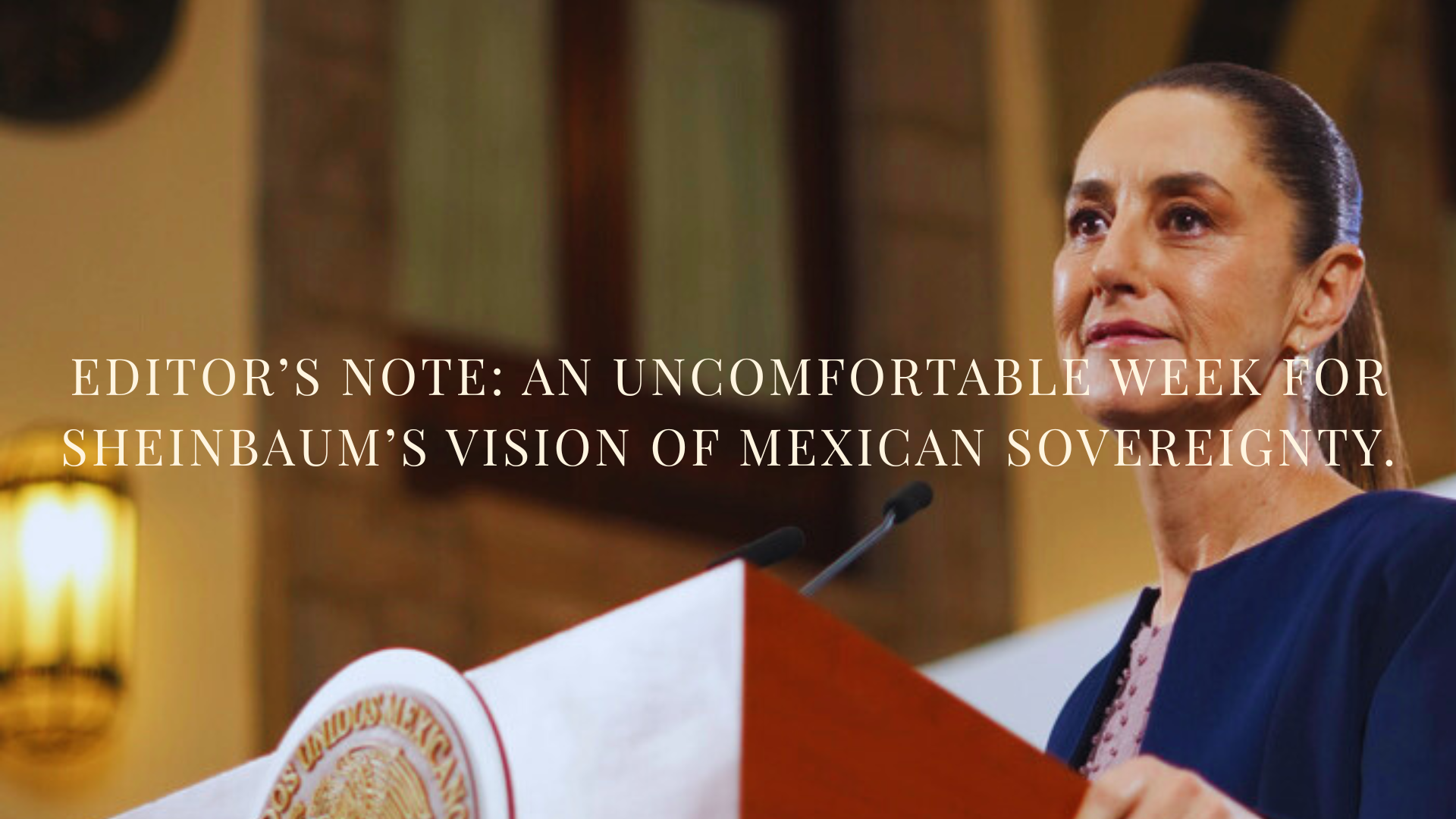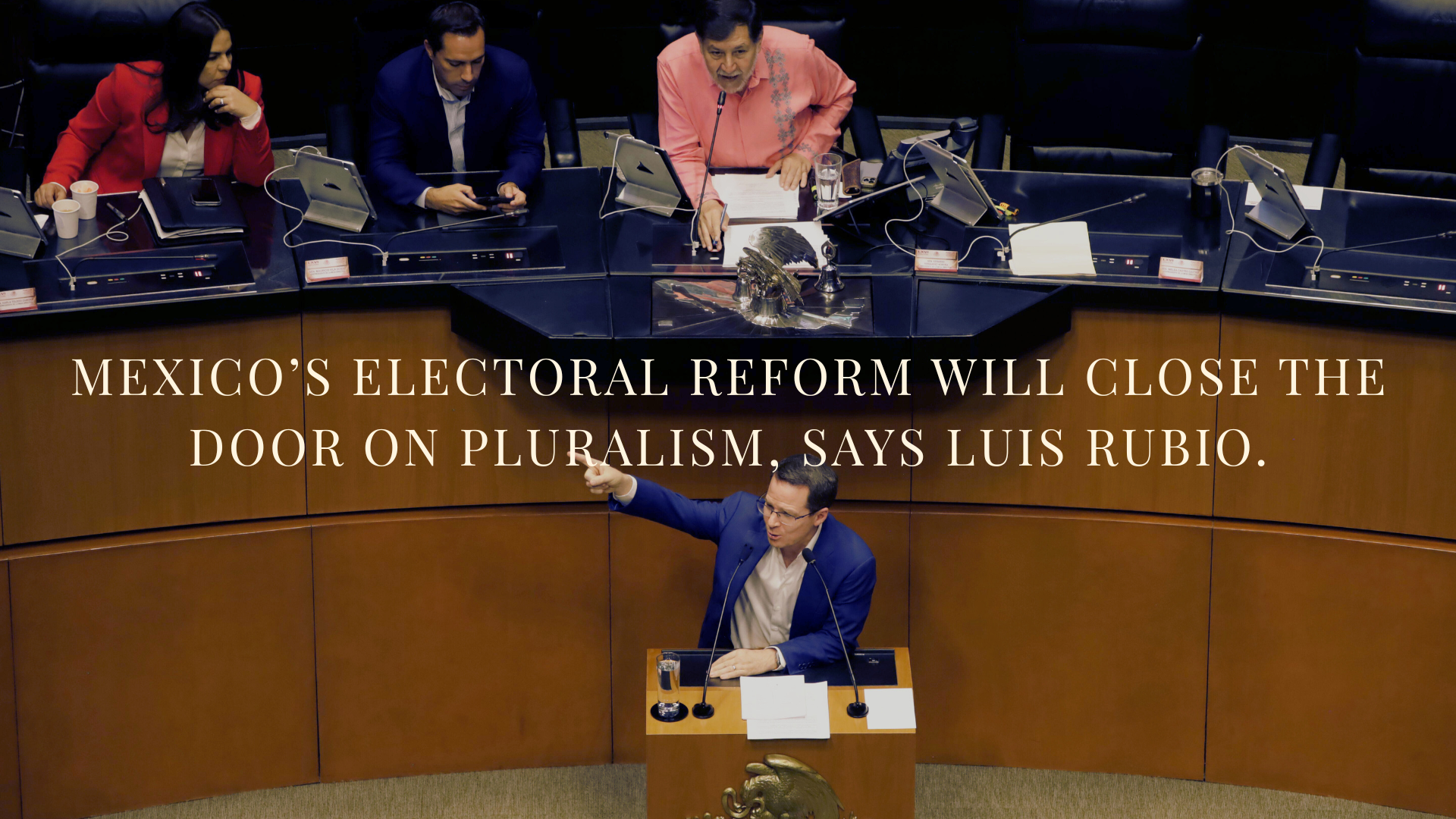
Sheinbaum at one year: A ‘complex’ operator emerges
by David Agren, writer-at-large.
President Claudia Sheinbaum swore the oath of office one year ago in a ceremony laden with symbolism as she became Mexico’s first female president. Flanked by female cadets, she took the sash from Infigenia Martínez – a prominent figure on the Mexican left and trailblazer for women in Mexican politics – as lawmakers in the lower house of congress chanted, “¡Presidenta!”
She unveiled the logo for her government, featuring an Indigenous woman. She assumed the presidency with a crushing electoral mandate, capturing more than 60 per cent of the popular vote in the June 2024 election – the highest total since the heyday of Institutional Revolutionary Party (PRI) rule in the 1970s.
But she arrived at the inauguration in the shadow of…

Sheinbaum’s first year has been a contradictory & muddled experiment
Around this time last year I was just arriving back in London, having traveled to Mexico for President Claudia Sheinbaum’s historic inauguration. While I encountered a handful of people already dismissive of Sheinbaum and contemptuous of her MORENA party, most I met were prepared to give the incoming president the benefit of the doubt. Many were hopeful that once in office she would prove as inspirational as the symbolism of her election promised. She had a great deal of political goodwill and capital to burn. One year on, her personal approval continues at stratospheric levels. But her consistently lower numbers on specific policy areas suggest a public aware of the tensions that mark her conflicted and contradictory first year in power.
The conventional wisdom is that on the big ticket items of trade and security Sheinbaum has scored some wins. Her management of the U.S.–Mexico relationship has been cautious but effective. With Donald Trump back in the White House, Mexico’s northern border could have become an economic choke point. Instead, Sheinbaum prioritized the survival of the USMCA, resisting confrontation and avoiding the rhetorical skirmishes her predecessor seemed to relish. In doing so, she not only kept U.S. trade threats at bay but also drew Canada closer as a quiet ally. Marcelo Ebrard has played the role of economic diplomat in chief, constantly negotiating with Washington, reinforcing Mexico’s stance as a stable partner in an era of volatile politics.
Yet a sizeable…

What place does Claudia Sheinbaum want in Mexico’s history?
by Andrew Law, editor and founder.
Mexican President Claudia Sheinbaum became the first woman to deliver the cry of independence from the Presidential Palace this week, coinciding with the 215th anniversary of the nation’s independence. She used the moment to highlight female heroes long excluded from the ritual, remarking that recovering women’s place in Mexico’s history is part of what it means to be the country’s first female president. For generations of girls, she asked, what did it mean to hear only men named as heroes of independence, to never see yourself reflected in the story of your nation?
That a woman was all but guaranteed to win the presidency in last year’s election is a point of pride for a country still marked by machismo and an epidemic of violence against women and girls. This week of all weeks, her symbolism is undeniable, and Sheinbaum was right to recognize her responsibility in correcting the historic record. But one year on, what matters is whether Sheinbaum can turn the fact of being first into a transformative act…

Editor’s note: An uncomfortable week for Sheinbaum’s vision of Mexican sovereignty
by Andrew Law, editor and founder.
This week a video circulated on social media of former Mexican president Felipe Calderón decrying the country’s freshly implemented judicial reform at Georgetown University in Washington, DC.
In it, Calderón called MORENA’s reform a “demolition project” that had likely rendered free elections a thing of the past. What seemed to irritate President Claudia Sheinbaum most, however, was Calderón’s suggestion that former US ambassador Ken Salazar should have intervened. Sheinbaum did not hold back at her morning press conference: “It's outrageous, there's no other word for it. He goes to the United States to say that the American ambassador should have intervened to prevent the judicial reform from passing. Aside from being spurious, he's a traitor.”
Sheinbaum rarely misses a chance to stress Mexico’s sovereignty in her dealings with Washington. When Secretary of State Marco Rubio visited last week to highlight security cooperation, the first line of the joint statement stressed respect for sovereignty, echoing…

Mexico’s electoral reform will close the door on pluralism
by Luis Rubio, political analyst and Chair of México Evalúa.
President Claudia Sheinbaum has announced an electoral reform. Its details have not yet been made public, but its spirit has been clear since the beginning of the year, laid out through a series of official statements. What motivates this initiative is radically different from the logic that inspired every electoral (or political) reform since 1962, when Mexico introduced the figure of “party deputies” — in other words, opposition representatives — as a way to open space for diverse voices, oxygenate the system, and preserve political stability.
The central question is not what the reform will contain — its intent is already known — but how the two minor allies, the Green Party (PVEM) and the Labor Party (PT), will act. Without their support, passage is impossible.
From 1962 onward, every electoral reform pursued the same purpose: injecting oxygen into the political system. That was the rationale behind the 1978 reform engineered by Jesús Reyes Heroles, which gave legitimacy to left-wing parties such as the Communist Party and the Mexican Workers’ Party. Their numbers were negligible, but…


The Morena Pact
In 1989, a series of protests and disturbances in China culminated in the massacre at Tiananmen Square, Beijing’s central plaza. The event shook not only China, but also the outside world, which had placed its hopes on reintegrating China into the community of nations. No less important, the bloodshed threatened the country’s ongoing process of economic transformation. Gradually, internal peace was restored, and an implicit social pact was forged that became the cornerstone of the spectacular economic growth that followed. That pact consisted of an implicit exchange: the government would do whatever was necessary to ensure rapid economic and living standard growth, in return for the population’s acceptance of the Communist Party’s exclusive rule and a commitment not to challenge the political system. The result was staggering.
Although Mexico is not — and cannot be — like China, Morena has been gradually advancing toward a similar arrangement, also implicitly. The Morena pact, articulated over the course of the previous sexenio, reveals not only the nature of Morena, with its dogmas and factions, but also the country’s current moment. One way to describe it is as a tacit agreement whereby the population accepts that there will be no economic growth, jobs, or a functioning health system in exchange for the continuation of social programs and cash transfers.
Of course, this is not a formal agreement, nor one that is explicitly recognized, but rather a de facto exchange that was shaped during the previous administration and that now explains the two most relevant factors in national politics: first, the president’s high popularity, and second, the elevated consumption levels among Mexico’s lower middle class — the primary beneficiaries (and clientele) of the government.
This also explains…


Mexico’s democratic transition turns 25 - or only 7, if you ask Morena…
by David Agren, writer-at-large.
Morena supporters marked one of their movement’s many anniversaries on July 1: the seventh anniversary of the ruling party’s founder, former Andrés Manuel López Obrador, overwhelmingly winning the 2018 election.
AMLO’s win brought the left to power, though critics accused the new president of governing like a conservative with his initial agenda of austerity. And supporters claimed AMLO’s win finally brought democracy to Mexico, despite multiparty elections being held at all levels of government throughout this century.
“This July 1st, we proudly celebrate the day of the revolution of consciences. Long live the Fourth Transformation!” President Claudia Sheinbaum posted on X.
The so-called Fourth Transformation (4T) – as AMLO christened his movement – diligently marks anniversaries, which offer pretexts for a populist movement to mobilise its base and herd social-benefits recipients to rallies.
Mexico also marked a major anniversary – unrelated to AMLO – which passed uncelebrated: Former president Vicente Fox ended one party rule on July 2, 2000, ousting…

Mexico’s government is using the disappeared to build a surveillance state, families say
by Madeleine Wattenbarger.
A polemical point of the reform to the General Disappearance Law passed by Mexican legislators this week is the use of a biometric CURP to search for missing people. The reform is part of a broad legislative package that includes a reform to the General Population Law, which establishes the use of a CURP with fingerprints and a photograph as an identification document obligatory for access to public and private services. The data will go into a Unified Identity Platform (PUI, by its initials in Spanish), which will, in theory, permit the authorities to locate missing people by their CURP.
A previous iteration of the biometric CURP proposal was backed by the World Bank, and similar initiatives were proposed by Felipe Calderón, Enrique Peña Nieto and former Secretary of the Interior Olga Sanchez Cordero. The reform comes out of a proposal presented by Claudia Sheinbaum on March 27, after disappearances in Mexico were thrown into the spotlight: search collectives found a ranch in Teuchitlán, Jalisco, where victims of forced recruitment were held, and the United Nations Committee on Forced Disappearance gave the official assessment that systematic state disappearances exist in Mexico.
After Sheinbaum presented the reform to the General Disappearance Law, the government held a series of feedback sessions with search collectives and victims’ families. Some of the families’ proposals appear in the revised law passed by the Senate. It will incorporate…

Mexico is paying a high price for its opposition parties’ malaise
by Gerónimo Gutíerrez.
Editor’s note: Amb. Gutíerrez served as Mexico’s Ambassador to the United States and also as Mexico’s Undersecretary for Governance.
Mexico’s political opposition today finds itself in a dire position. Since its founding in 2014, the ruling Morena Party has made extraordinary gains. It now holds the presidency, 23 of 32 governorships, comfortable majorities in the federal congress and 27 state legislatures, and, together with its allied parties (the Workers' Party, or PT, and the Green Party, or PVEM), has the power to enact laws and even amend the Constitution at will. President Sheinbaum enjoys exceptionally high approval ratings (around 70%), much like her predecessor, former President Andrés Manuel López Obrador, did.
In recent years, Morena-led governments have taken actions that appear to significantly weaken institutional checks and balances, the separation of powers, and democratic norms. To be sure, Morena and the President reject this characterization — but critics, both in Mexico and abroad, make a persuasive case. For example, the Global Democracy Index published by The Economist now classifies Mexico as a hybrid regime, no longer even a flawed democracy.
In the 2024 election, the traditional parties (PAN, PRI, and PRD) received only 27% of the presidential vote, compared to the 60% won by Claudia Sheinbaum. Currently, the PAN governs just four states, the PRI only two, and both hold modest parliamentary groups in Congress. The PRD no longer exists. Movimiento Ciudadano (MC) appears to be the emerging party. It secured a significant 10% of the presidential vote in the last election and currently governs two states. However, it is hampered by internal inconsistencies and scandals, which raise serious doubts about its long-term potential.
Under these circumstances, it is only natural to ask whether the political opposition has pursued the right strategy to counter Morena’s rise — and if not, what that strategy could look like in the future. There are no easy answers, but perhaps a few sensible working hypotheses.
In a country where 43% of the 128 million population lives in poverty (according to 2022 official figures), machine politics work. The Morena governments have built a vast platform of social programs, including direct cash transfers that reach an estimated 25 million households. Opposition parties have wavered between timidly supporting these programs and criticizing their effectiveness, political bias, and fiscal sustainability. Unless they can clearly articulate where they stand…

